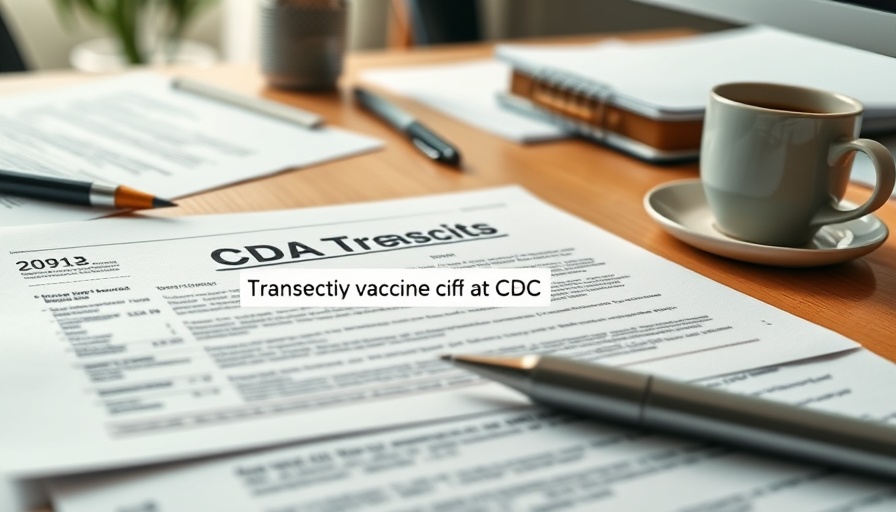
The Resignation Shake-up at the CDC: A Sign of Trouble Ahead?
In a remarkable turn of events concerning U.S. public health, three senior officials from the Centers for Disease Control and Prevention (CDC) have resigned. Their departures come in the wake of significant modifications to vaccine policy under Health and Human Services Secretary Robert F. Kennedy Jr., prompting wider implications for public trust in vaccine efficacy and safety.
Understanding the CDC's Leadership Changes
The resignations of Debra Houry, Demetre Daskalakis, and Dan Jernigan raise questions about the nature of leadership and oversight in a pivotal health organization. Each of these officials cited their inability to continue in a workplace where the integrity of science appears compromised. Kennedy's decision to replace the traditional Advisory Committee on Immunization Practices (ACIP) with advisors characterized as vaccine skeptics alarmed these veteran professionals.
What Led to Such Mass Resignations?
Houry, who held the title of chief medical officer at the CDC, expressed her concerns regarding the premature issuance of recommendations by Kennedy's selected advisors. “As scientists, you should never know in advance what you want the data to show,” stated Houry. This sentiment resonates deeply within scientific communities that rely on objective data interpretation rather than predisposed outcomes.
Daskalakis, who previously directed the National Center for Immunization and Respiratory Diseases, warned of potential public harm resulting from the new direction of vaccine policies. He refers to the Hippocratic Oath, emphasizing the commitment physicians make to ensure patient safety.
The Shift in Vaccine Policy: Public Perception at Risk
Kennedy's approach has been framed as a move for greater transparency, challenging longstanding norms. However, critics argue it fosters chaos, further diminishing confidence in vaccines when public reliance on them is critical. The apparent placement of figures like Lyn Redwood and David Geier—identified as vaccine skeptics—onto influential committees raises alarms about the credibility of recommendations made under their advisorship.
This change in CDC dynamics mirrors wider societal debates where science and public faith increasingly collide, leading to potential misalignment between the government’s public health directives and the actual needs for disease prevention.
The Implications of These Changes on Vaccination Rates
Amid the turmoil, several states are proactively concocting their own vaccination guidelines in anticipation of an uptick in respiratory illnesses in the coming autumn. This indicates that trust in federal vaccine recommendations may be waning, compelling states to take matters into their own hands.
The resignation of these high-ranking officials signals more than just dissatisfaction; it highlights a fracturing within the CDC—an essential body responsible for public health. With major vaccine updates looming, public access to effective inoculation programs could drastically shift based on these recent developments.
Looking Ahead: New Strategies for Public Health
As discussions abound regarding vaccine accessibility and safety, the FDA’s narrowing of eligibility for updated COVID-19 vaccines adds yet another layer of concern. Patients may find increased difficulty in accessing care or getting coverage for their vaccinations, which could ultimately affect overall public health outcomes.
Industry experts must collaborate to restore the public's trust in vaccines, emphasizing the scientific rigor that traditionally informed these life-saving drugs. Now is the time for open, honest dialogue regarding the balance between vaccine advocacy and maintaining scientific integrity.
The Role of Public Engagement in the Vaccine Narrative
Amidst these resignations and shifts, there lies an opportunity for a fresh narrative around vaccines. Public health leaders, politicians, and healthcare professionals should work together to actively engage with communities, address their concerns, and clarify misconceptions regarding vaccinations.
In addition to rebuilding trust, actions must focus on education and the development of transparent policies that are understandable and acceptable to the public. Perhaps through joint efforts within communities, we might fortify the frameworks required for informed and responsible decision-making about vaccines.
The recent turmoil at the CDC foreshadows a critical juncture for public health in America. The choice to resign rather than endorse a framework they viewed as dangerously flawed speaks volumes about the state of scientific integrity at the heart of health policy. Stakeholders across all levels must resolve to prioritize scientific facts in the evolving narrative surrounding vaccines.
In light of these recent developments, live engaged in the ongoing conversation about vaccines, exploring the implications these changes may have on future health initiatives and public trust. The wellbeing of the population should remain at the forefront of these discussions as we navigate this complex landscape.
 Add Element
Add Element  Add Row
Add Row 



Write A Comment